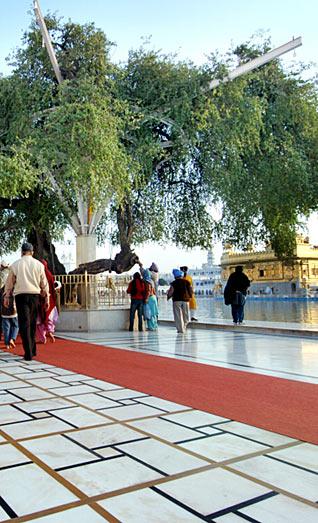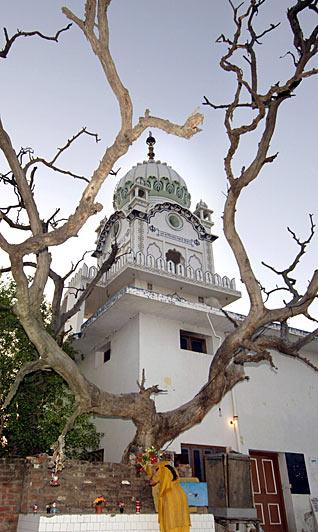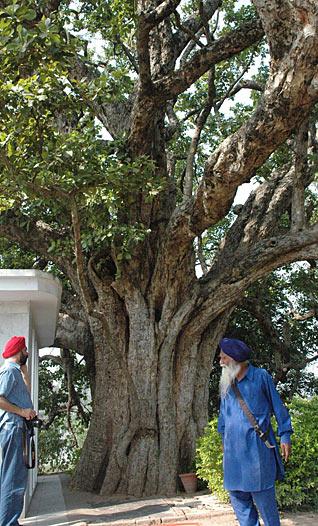Faith
Our Green Guru
by D.P. SINGH
Organisms respond to changes in their environment by evolutionary adaptations in form and behaviour. At present we face great survival challenges as both these factors have come under undue stress due to our unbridled demands of high national economic growth and expanding individual needs and desires.
All the biotic and abiotic factors that act on an organism, population or ecological community and influence its survival and development, constitute its environment. Biotic factors include the organisms themselves, their food and their interactions. Abiotic factors include such items as sunlight, soil, air, water, climate and pollution.
Grave crisis
Pollution is contaminating air, land and water. The survival of many animal and plant species, and possibly that of humankind itself, is at stake. At the biotic level, humanity is facing a social justice crisis, largely self-generated, having to deal with issues of poverty, hunger, disease, exploitation and injustice that are becoming widespread. There is serious concern that the earth may no longer be a sustainable biosystem. Although human beings are believed to be the most intelligent life form on earth, we are responsible for almost all the ecological damage done to the planet.
Guru Granth Sahib
The Sikh scripture, Guru Granth, declares that the purpose of human beings is to achieve a blissful state and to be in harmony with the earth and all of God's creation. It seems, however, that we have drifted away from that ideal. Guru Granth says that humans create their surroundings as a reflection of their inner state. Thus, the increasing barrenness of the earth reflects a spiritual emptiness within us.
Interdependence
Sikhism is concerned with the relationship between humanity and the environment. Sikhs believe that an awareness of the sacred relationship between humans and the environment is necessary for the health of our planet, and for our survival. In the Guru Granth, Man and the material world (biotic and abiotic components of the environment) are no more seen as external to each other, but as being involved in an interdependent relationship , reciprocally conditioning the life of each other. Guru Nanak stresses this kind of interdependent relationship in his opening composition in Guru Granth - the Japji.
Guru Granth declares that the purpose of human beings is to be in harmony with all creation; human domination is to be rejected. Sikh Gurus - literally, teachers - recognised human responsibility towards the material world and its phenomena. So, the importance of air, water and earth to life are emphasised repeatedly in the Guru Granth. The earth is referred to as the mother and as such needs to be respected. The pollution of these three elements is against the principles laid down by the Gurus.
Gurdwaras
Sikh places of worship - gurdwaras - include large pools that support marine life, especially fish. This was clearly a sign to live in harmony with the environment rather than in conflict with it. Guru Har Rai, the Seventh Sikh Teacher, developed Kiratpur Sahib as a town of parks and gardens, located on the banks of a tributary of the Sutlej. He planted flowers and fruit-bearing trees all over the area. This created a salubrious environment, attracting beautiful birds and turning it into an idyllic place to live in.
Nature as Teacher
The material world and its phenomena, a major component of our environment, is a great spiritual teacher because it enables the seeker to be in touch with ultimate reality. God is revealed through His all-powerful creative nature. Gurbani - the verses of the Guru Granth - points out that everything seen is God in action. It extols the interrelationship of God and nature.
Every creature in this world is a manifestation of the creator: "The creator created Himself ... And created all creation in which He is manifest. You are yourself the bumble bee, flower, fruit and the tree. You are yourself the water, desert, ocean and the pond. You are yourself the big fish, tortoise and the cause of causes. Your form cannot be known."
One World, One Family
On the biotic front, according to Sikhism, environmental concerns must be viewed as part of the broader issue of human development and social justice. Sikhism emphasises harmonious living as our main objective. In1699, the Tenth Turu founded the Order of the Khalsa, whose members are committed to ensuring the preservation and prevalence of a world society, echoing the concept of one world, one family.
Interconnectedness
All of life is interconnected. A human body consists of many parts; every part has a distinct name, location and function, and all of these are dependent upon each other. In the same way, all the constituents of the universe and the earth are dependent on each other. The decisions taken in one country or continent cannot be ignored by people in other countries or continents. Choices in one place have measurable consequences for the rest of the world.
Any solutions to the problem of the environment must be sensitive to women's concerns, and must include women as equals. Community-based sharing of resources like the community meal or langar prevalent in gurdwaras worldwide is another practice central to Sikhism, which promotes the sharing of scarce resources. Along with recycling and avoidance of wastage, Sikhism promotes an integrated approach to life. Such an approach, if adopted to face the current environmental crisis, can lead to permanent sustainability of life on mother earth.
All photos by Damanbir Singh Jaspal, from his book, Tryst with Trees: Punjab's Sacred Heritage - homepage,, thumbnail, and top of this Page: Ber Baba Buddha ji, Durbar Sahib, Amritsar. Below: bottom photo: Gurdwara Luhura Sahib, Lahore, Pakistan. Second from bottom: Gurdwara Kalp Vriksh, Ropar. Third from bottom: Gurdwara Tahli Sahib, Hoshiarpur.
[Article, courtesy: sikhphilsophy.net]
December 5, 2009
Conversation about this article
1: Dr. Birinder Singh Ahluwalia (Toronto, Canada), December 06, 2009, 9:27 AM.
Wonderful article - I am eager to see and enjoy the "Tryst with Trees" exposition put together by Sardar Damanbir Singh Jaspal. I hope we will be able to bring this exposition to Canada in 2010 (designated by UN - Year of Biodiversity).
2: Harinder (Bangalore, India), December 06, 2009, 11:44 AM.
Beside conserving, it is good to be also creative. Humanity should find new homes (planets)amongst the million galaxies described by our Gurus. We should find an infinite source of clean energy, such as in vacuum energy, dark energy, etc. Man may have to abandon this earth one day when our sun dies. Moral: be creative and optimistic.
3: Gurinder Singh Johal (Amritsar, Punjab), December 07, 2009, 9:44 AM.
It is an informative article which teachs us the importance of the enviornment as per the Sikh tenets. But unfortunately, some of the babas doing kaar seva have wiped out so many baaghs (gardens) in the surroundings of many gurdwaras. In the 20th century, the Sikh community in Punjab has only built concrete buildings of gurdwaras. They have left no space for the birds, for example. No doubt we can see some fantastic buildings in marble, but the aesthetic look is missing. Guru Granth was compiled by The Fifth Master, Guru Arjan, at Ramsar Sahib. This place is said to be very romantic, calm and serene, with a pool of water surrounded by trees. Where are those trees now? Amritsar was once considered a City of Gardens, but now only three gardens are left. Amritsar has become a jungle of houses. The enviornment has become so poluted ... oddly, there is no edict from The Akal Takht to protect the environment of this sacred city so special to us all.
4: Amitoj (U.S.A.), December 10, 2009, 1:58 AM.
Well said, Gurinder! Could not agree more. Only nature can stimulate creativity; marble, granite, steel, etc. structures cannot take the place of trees, flowers.






